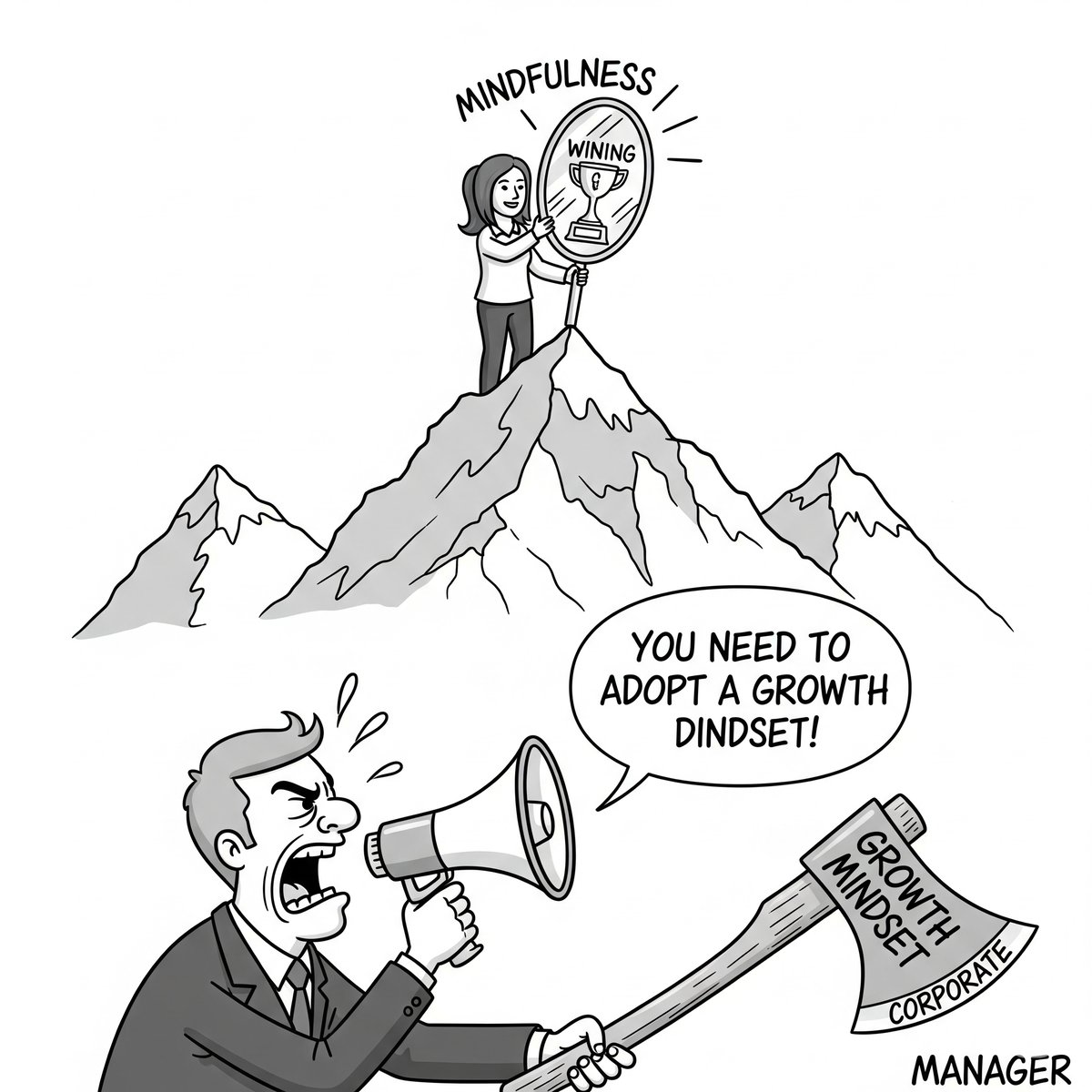“Be open to feedback.” “Lean into discomfort.” “Adopt a growth mindset.”
These are mantras we hear all the time, especially in tech and corporate environments that pride themselves on high performance and rapid change. But these days, they’ve taken on a heavier tone. More and more employees are being asked to 'embrace growth' in the midst of shifting priorities, layoffs, and AI-driven disruption — often without clarity, context, or support.
The idea of growth mindset has gone from being a personal development tool to something companies invoke during performance reviews, reorganizations, and career conversations, sometimes helpfully, but often as a shield against deeper truths.
And at face value, they’re useful. Growth mindset helps us learn, adapt, and build resilience.
But lately, I’ve noticed something unsettling: growth mindset is being weaponized. Instead of empowering employees, it's often used to justify vague feedback, excuse poor management, or deny recognition. In the age of AI-driven transformation, layoffs, and "talent optimization," this misuse is more common — and more damaging — than ever.
The Promise of Growth Mindset
Originally coined by psychologist Carol Dweck, growth mindset is about believing that your abilities can be developed through dedication and hard work. It’s a powerful concept when it truly comes from within. I’ve embraced it myself throughout my career — especially in high-ambiguity roles like data product management, where you often build foundations no one sees until something breaks. Real growth takes self-reflection, patience, and grit.
How Companies Misuse It
The corporate version, however, often distorts this intent. I’ve seen it happen — and many have experienced it too. You work hard, take ownership, deliver impact, and yet… you’re told you’re “not ready for promotion.” You ask for clarity, and you receive a pile of vague feedback: “You could be more strategic,” “You need to collaborate more,” “You should step up as a leader.”
Sometimes, that feedback is real. But often, it’s a cover for something no one will say out loud: “We aren’t doing promotions this year.” Or “Someone above me has blocked all growth conversations for budget reasons.”
But your manager isn’t at liberty to say that. They’ve now become the voice of the system. And so they reach for what’s safe, what sounds good: “Have a growth mindset.”
Except now it’s not an invitation. It’s a deflection.
Growth Mindset Depends on Real Feedback
Growth mindset depends on meaningful feedback. At its best, it encourages you to treat mistakes as learning opportunities and to embrace challenges as fuel for development. But for that to work, the feedback has to be real — grounded in context, delivered with care, and aimed at helping you improve.
When feedback becomes vague, performative, or politically motivated, asking for a growth mindset becomes disingenuous. It shifts the burden to the employee, without offering the clarity or support required for growth.
The Gaslighting Effect
The worst part? It undermines your achievements. You begin to question your own progress. You start thinking maybe you really aren’t good enough.
That’s not growth. That’s gaslighting.
And in environments experiencing AI shifts, re-orgs, and strategic pivots, the pressure to reinvent yourself “to stay relevant” can become a way to quietly trim staff — without ever calling it that. You’re told to evolve faster, learn more, do more — all while being asked to ignore the structural blockers standing in your way.
Growth ≠ Submission
Growth mindset without mindfulness can turn into something dangerous. Without discernment, the pursuit of growth becomes less about learning and more about compliance — a tool for survival in an environment where boundaries are unclear and feedback is vague.

True growth requires more than just willingness. It requires awareness — the ability to pause, reflect, and ask:
- Is this feedback helping me grow, or is it reshaping me to fit someone else’s agenda?
- Am I stretching because I want to, or because I’m afraid not to?
Mindfulness is what keeps growth authentic. It gives you the power to recognize when the environment is nurturing you — and when it’s manipulating you. In a world where agility is praised but honest dissent is punished, staying grounded is an act of self-preservation.
And while managers often find themselves in difficult positions, tasked with delivering top-down messages they didn’t author, they’re not powerless. They can advocate for clarity, refuse to pass along empty narratives, and help their teams navigate complexity with honesty. They may not be able to change the system overnight, but they can be the reason someone else doesn’t doubt their worth.
I’m still a believer in growth mindset. I’ve coached and mentored others with it. I’ve leaned on it in hard moments. But I’ve also learned that growth without clarity becomes chaos, and growth without care becomes control.
So grow. But grow for the right reasons. Grow with awareness. Grow while holding onto your worth.
Because if someone is asking you to stretch, make sure they’re not just trying to shrink you.
And if you're in a role where feedback feels more like a fog than a guide, pause. Ask yourself: Is this helping me grow, or just keeping me quiet? Mindfulness isn't a luxury — it's a necessity. It's what helps you see clearly when the system is trying to blur your reflection.
And if you're in a position of power, even informally — as a mentor, peer, or manager — model what mindful feedback looks like. Don't just pass along narratives. Interrogate them. Challenge them. Help others grow not through pressure, but through clarity.
Growth mindset still matters. But without mindfulness, it’s just noise with a motivational sticker.
Final Thoughts
If this resonates, or if you’re navigating this yourself, feel free to connect. I mentor product professionals — especially those working in the invisible layers of data, infrastructure, and internal platforms.







